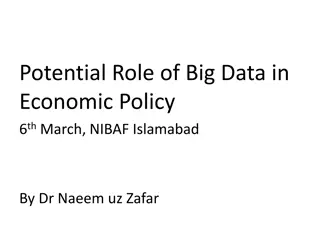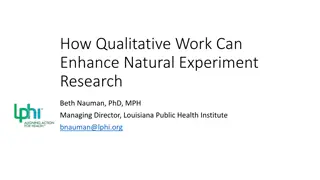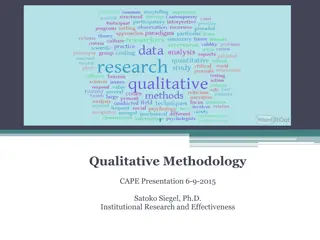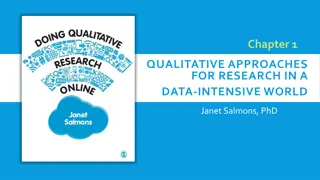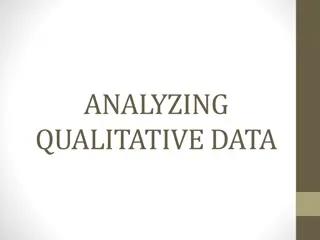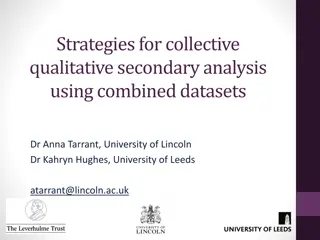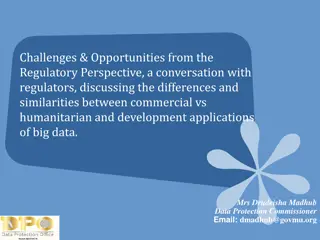Introduction to Big Data Analysis - National Taipei University Course Overview
This course at National Taipei University delves into fundamental concepts, research issues, and practical applications of Big Data Analysis. Taught by Dr. Min-Yuh Day, the syllabus covers topics such as AI, machine learning, deep learning, and industry practices related to big data analysis. Studen
6 views • 80 slides
Potential Role of Big Data in Economic Policy
Over the past two decades, there has been a significant proliferation of big data, leading to the emergence of new challenges and opportunities in economic policy formulation. The use of big data, with its three defining characteristics (volume, velocity, and variety), poses questions about the futu
3 views • 26 slides
Understanding Quantitative and Qualitative Research Methods
Exploring the differences between quantitative and qualitative research methods, this content delves into the importance of qualitative research, various methodologies such as focus groups and interviews, data collection, research ethics, and analysis techniques. It also covers the elements of the r
4 views • 43 slides
Understanding Qualitative Research: Foundations and Orientations
Explore the foundations of qualitative research and orientations to meaning in Big Q qualitative methods. Delve into the values, characteristics, and theoretical underpinnings of qualitative inquiry, and reflect on the significance of meaning-making in research. Consider the role of subjectivity in
0 views • 23 slides
Understanding Self-Acceptance Through the Big I, Little i Exercise
Explore the concept of self-acceptance through the Big I, Little i exercise. Discover how the Big I represents your totality, while the little i symbolizes various aspects of yourself. Reflect on your positive, negative, and neutral traits with guidance on filling in the Big I to gain a deeper under
0 views • 5 slides
Understanding the Case Study Method: In-depth Qualitative Analysis
The case study method is a popular form of qualitative analysis involving intensive observation of a social unit. It focuses on detailed analysis of a limited number of events or conditions to understand complex interrelationships. Characteristics include intensive study of a single unit, qualitativ
1 views • 8 slides
Enhancing Natural Experiment Research Through Qualitative Work
Qualitative research plays a crucial role in enhancing natural experiment studies by providing insights into the processes of exposure to interventions, identifying variables influencing exposure likelihood, and determining suitable control groups. Complementary methods within the RE-AIM framework a
0 views • 13 slides
Qualitative Data Analysis Techniques in Research
The purpose of data analysis is to organize, structure, and derive meaning from research data. Qualitative analysis involves insight, creativity, and hard work. Researchers play a crucial role as instruments for data analysis, exploring and reflecting on interview discussions. Steps include transcri
1 views • 27 slides
Using Qualitative Methods in Quality Improvement Projects
Qualitative methods offer valuable insights in quality improvement projects by capturing non-numerical information like experiences, thoughts, and perspectives. They help to understand patient and staff perspectives, challenges, and successes in QI initiatives. Utilizing techniques such as interview
1 views • 21 slides
Understanding Experiential vs. Critical Qualitative Research
Delve into the foundations of qualitative research with a focus on experiential and critical approaches. Explore key concepts, defining characteristics, and theoretical foundations, distinguishing between qualitative and quantitative research. Reflect on different orientations, subjectivity, and ref
0 views • 16 slides
Exploring Key Characteristics of Qualitative Research in Psychology
The lecture series delves into the values, characteristics, and theoretical foundations of qualitative research, emphasizing the differences from quantitative methods. It explores experiential and critical qualitative camps, subjectivity, reflexivity, and ontological and epistemological foundations.
4 views • 18 slides
Ensuring Trustworthiness in Qualitative Research Studies
Trustworthiness in qualitative research is essential for establishing confidence in the study outcomes. Guba's four criteria - credibility, transferability, dependability, and confirmability - provide a framework for achieving trustworthiness. Strategies such as adopting reliable research methods, u
3 views • 10 slides
Understanding NVivo: A Brief Introduction to Qualitative Data Analysis Software
Explore the world of NVivo with Dr. Will Fassbender, an Assistant Professor at Montana State University. Gain insights into qualitative data analysis, download procedures, basic functions, and more. Join this introductory session to discover how NVivo can streamline your research process and aid in
0 views • 16 slides
Contrasting Qualitative and Quantitative Traits in Genetics
Genetic traits in organisms can be qualitative or quantitative, with qualitative traits controlled by single genes and showing distinct variations, while quantitative traits are influenced by multiple genes and environmental factors, resulting in continuous variations. Qualitative genetics focuses o
0 views • 13 slides
Qualitative Analysis of Aldehydes and Ketones in Chemistry Lab
In this Chemistry 318 lab, students will conduct qualitative analysis of aldehydes and ketones using chemical and spectroscopic methods. The lab includes classification tests, spectroscopy (IR, 1H-NMR/13C-NMR, MS), and identification of unknown compounds. Experimental procedures involve physical eva
1 views • 11 slides
Understanding Quantitative Genetics Principles in Animal Breeding
Quantitative genetics focuses on the inheritance of characteristics based on degree rather than kind, compared to qualitative genetics. It involves polygenes controlling quantitative traits, which exhibit continuous variation and can be measured using metric units. Qualitative traits, on the other h
0 views • 22 slides
Meet the Big Green Monster with Purple Hair and Yellow Eyes
In this playful and colorful story, encounter the big green monster with big yellow eyes, sharp white teeth in a big red mouth, a long blue nose, two little orange ears, big purple hair, and a scary green face. Despite its appearance, the monster doesn't scare the storyteller and is told to go away
0 views • 13 slides
Understanding Qualitative Methodology: An Overview
This presentation delves into the realm of qualitative methodology, exploring its purpose, characteristics, approaches, data collection methods, analysis, and learning outcomes. It aims to provide a deep understanding of how qualitative research illuminates voices and experiences, distinguishes betw
0 views • 41 slides
Qualitative Approaches in a Data-Intensive World
Qualitative research involves studying perceptions, experiences, and behaviors through verbal or visual expressions. In a data-intensive world, online communication plays a crucial role in data collection. Qualitative eResearch utilizes Information and Communication Technologies (ICTs) strategically
0 views • 10 slides
Meaning and Meaning-making in Big Q Qualitative Research
Qualitative research explores different understandings of meaning and meaning-making, providing researchers with tools, techniques, and values. Big Q qualitative research focuses on the active role of words in creating meaning beyond reflecting experiences. This lecture series delves into the founda
1 views • 20 slides
Exploring Astronomy Big Data and Cyberinfrastructure for AI Innovation
Harnessing the power of big data in astronomy, this presentation by Curt Dodds from the Institute for Astronomy at the University of Hawaii, Manoa, delves into the utilization of national cyberinfrastructure to advance artificial intelligence access and foster innovation in the field. The discussion
0 views • 40 slides
Analyzing Qualitative Data: Steps and Coding Methods
Understanding qualitative data analysis involves several key steps, such as preparing the data through transcription, developing codes and categories using content analysis, revising categories based on the data, and reporting the analysis results. Content analysis helps in identifying words, themes
0 views • 32 slides
Design Philosophy for Increasing Accessibility in Qualitative Data Analysis Software
Growing interest in qualitative research methods has led to increased use of Qualitative Data Analysis Software (QDAS). However, challenges remain in making these tools accessible and easy to use, especially in educational settings. This article explores design philosophies to enhance accessibility
0 views • 16 slides
Analyzing U.S. Higher Education Success Metrics: A Qualitative Perspective
Delve into the nuances of U.S. higher education success metrics through a qualitative analysis, exploring the classification of qualitative successes in quantitative datasets and the factors influencing accurate or inaccurate classifications. The study involves individuals who attended community col
0 views • 18 slides
Perceived Risks and Risks Mitigation Practices in Informal Waste Workers: A Qualitative Study
A qualitative study conducted in Kathmandu Valley exploring the perceived risks and mitigation practices of informal waste workers. The research project, led by Sujata Sapkota, aims to address the occupational and health challenges faced by these workers. The study includes a mix of quantitative and
0 views • 22 slides
Strategies for Collective Qualitative Secondary Analysis Using Combined Datasets
Collective qualitative secondary analysis involves reusing data through a collaborative lens, embracing multiple viewpoints to gain deeper insights. The approach emphasizes the constructed nature of research data and allows for diverse interpretations and engagements. This article discusses the proc
0 views • 15 slides
Understanding Big Data and Privacy Issues in Today's Society
Explore the intersection of big data and privacy through the insights of Bart van der Sloot. Delve into current privacy issues, the application of big data, legal frameworks, recent developments, and the challenges between big data and privacy protection. Gain knowledge from interactive debates, stu
0 views • 63 slides
Mathematical Modeling for Psychiatric Diagnosis in Big Data Environment
This research project led by Prof. Kazuo Ishii aims to develop a Big Data mining method and optimized algorithms for genomic Big Data, specifically targeting three major mental disorders including depression. The research process involves data analytics, mathematical modeling, and data processing te
0 views • 21 slides
Understanding Research Methods in Public Health
Exploring the nuances of qualitative and quantitative research methods in the context of public health, this content delves into how each approach offers unique insights and perspectives. It discusses the importance of qualitative research in uncovering underlying factors influencing health, interpr
0 views • 77 slides
Qualitative Approach in Cognitive Interview Data Analysis
Understanding the importance of a qualitative approach in analyzing cognitive interview data is crucial for uncovering patterns and recurring themes. This involves delving deeper into the why behind the responses rather than just naming and classifying data. Using methods like standardised coding sc
0 views • 18 slides
Navigating the World of Big Data, Knowledge, and Crowdsourcing
The world has evolved into a data-centric landscape where managing massive amounts of data requires the convergence of big data, big knowledge, and big crowd technologies. This transformation necessitates the utilization of domain knowledge, building knowledge bases, and integrating human input thro
1 views • 5 slides
Understanding Big-Oh Notation in Time Complexity Analysis
Big-Oh notation in algorithm analysis signifies how the runtime of an algorithm grows in relation to the input size. It abstractly characterizes the worst-case time complexity, disregarding constants and lower-order terms. The concept of Big-Oh, along with Big-Omega and Big-Theta, helps in comparing
0 views • 18 slides
Creative Problem Solving through High-level Qualitative Planning and Reasoning
Explore the world of abstract and high-level qualitative planning through examples like MacGyver's inventive solutions, opening jar tricks, and audience participation in problem-solving. Witness how qualitative reasoning can lead to innovative solutions in various scenarios.
0 views • 15 slides
Privacy Risks and Opportunities in Big Data for Development
Big data presents both risks and opportunities for development initiatives, with the potential to enhance policy-making processes. While big data can improve the efficiency of public policy and administration, concerns arise regarding data accuracy, inclusivity, and transparency. Upholding privacy p
0 views • 17 slides
Big Data and Ethical Considerations in Data Analysis
Big data involves analyzing and extracting information from large and complex datasets that traditional software cannot handle. AI algorithms play a crucial role in processing big data to find patterns that humans may overlook. Ethical considerations arise in defining what is "interesting" in the da
0 views • 25 slides
Understanding Qualitative Data in Counseling
Exploring the challenges and strategies in utilizing qualitative data in counseling, this discussion covers topics such as data collection, coding for meaning, and presenting qualitative evidence. The importance of qualitative data in improving counseling programs and student services is highlighted
0 views • 32 slides
An Overview of Big Data and Cloud Computing
Big data refers to vast and complex data sets difficult to process with traditional tools. Cloud computing tools like Hadoop and Spark enable the handling of big data. Types of big data include structured, unstructured, and semi-structured data. The evolution of technology, IoT devices, social media
0 views • 29 slides
EAA 2016: Big Data Analysis in Accounting and Auditing Symposium
The EAA 2016 Symposium focused on the impact of big data in accounting and auditing, featuring presentations on using data analytics to enhance audit quality, the influence of big data on management accounting research and the accounting profession. Speakers highlighted the importance of dealing wit
0 views • 4 slides
Exploring Regulatory Challenges and Opportunities in Big Data Applications
Discussing the regulatory perspective on commercial versus humanitarian and development applications of big data, this conversation with regulators highlights the differences and similarities in utilizing data for various sectors. Emphasizing the importance of trust, confidentiality, and data securi
1 views • 17 slides
Foundations of Qualitative Research: Understanding Methods and Data
Qualitative research involves a mix of different methods drawing on qualitative data, with debates on the need for a sensitive approach for richer appreciation. Understanding qualitative data and context, along with various types of data such as interviews and user-generated content, is essential fo
0 views • 41 slides

